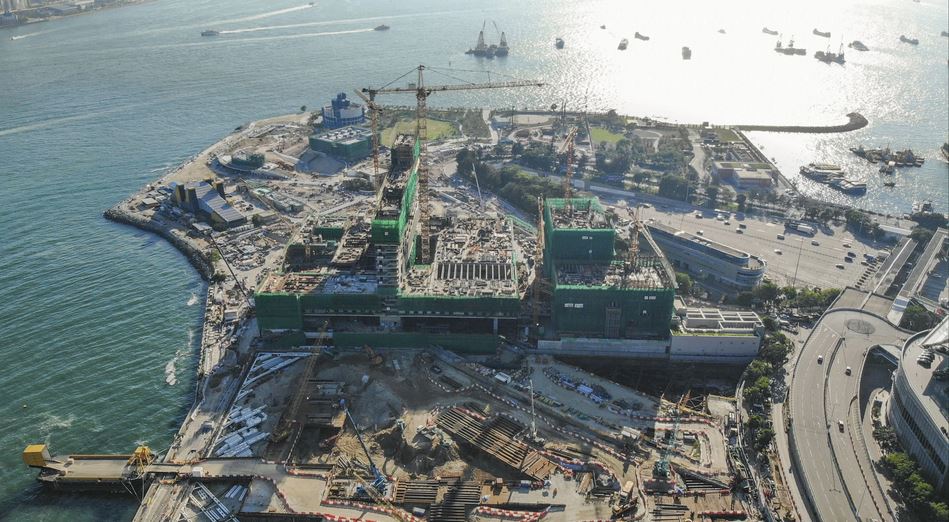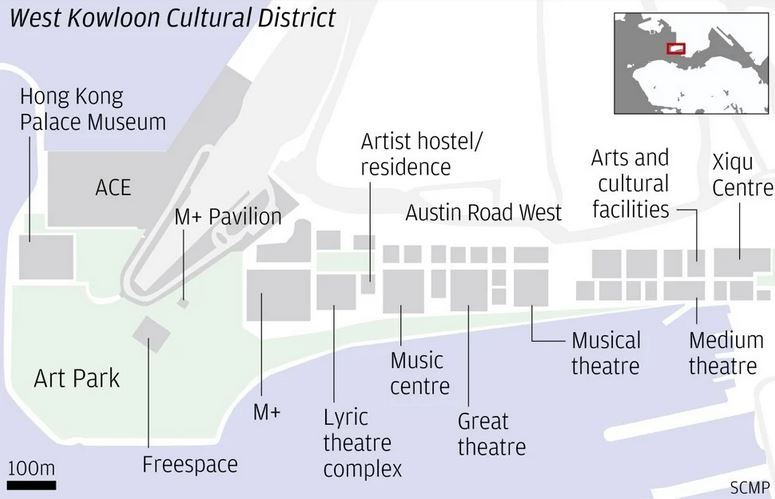Covid-19
pandemic triggers looming financial crisis for West Kowloon Cultural
District as developers avoid bidding for massive new project
Lawmakers worry that delayed Art, Commerce & Exhibitions project signals more money woes
Developers need more time to assess post-crisis recovery, impact of US-China trade war

The
West Kowloon Cultural District Authority’s (WKCDA) decision to withdraw
its tender for a massive commercial project in the multibillion-dollar
arts hub, following a cool response from developers, signals massive
deficits ahead, observers said.
Lawmakers
are worried that with the Covid-19 pandemic wreaking havoc on arts and
exhibition events, the authority will sink deeper in the red and keep
asking for more government funding.
“The
government is the most convenient ATM for it,” said Civic Party
lawmaker Tanya Chan, a member of a Legislative Council committee that
monitors the development of the massive West Kowloon arts hub.

Others,
however, felt it made sense to delay the project given the devastation
wrought on the economy by the pandemic and the uncertainty ahead,
including that spawned by the ongoing trade dispute between the United
States and China.
The
proposed Art, Commerce and Exhibitions (ACE) development, next to the
Hong Kong Palace Museum, includes an exhibition centre, a hotel and
rental offices, as well as retail, dining and entertainment facilities.
The
tender was called in April, with the contract expected to be awarded in
the fourth quarter and the project completed by 2025-26.
But
on August 6, WKCDA chief executive officer Duncan Pescod announced the
tender withdrawal, saying the response from developers “had not been as
positive as expected”, without indicating a relaunch date.
Lawmaker
Chan said the authority had seen costs rise even as its income has been
hit by its inability to rent its venues amid the pandemic.
Delaying the ACE project would “very likely” result in deepening deficits, she said, adding: “I
doubt the authority can plug its funding gap, because it’s difficult
for it to take out loans. It’s very likely it will seek more funds from
the government.”
The
ACE project, with a gross floor area of more than 135,000 square
metres, was meant to be developed under a build-operate-transfer model
for a period of 43 years.
The
successful developers would have split the income from the project with
the authority. Upon expiry of the term, the premises would be handed
over to the authority.
Stewart
Leung Chi-kin, a board member of the Real Estate Developers Association
of Hong Kong, said some developers might have had reservations about
taking on such a large project now, as it required a huge investment.
“Everyone is not sure about the impact of the US-China trade disputes,” he said.
He
felt the authority’s decision to pull back was wise, as it allowed
everyone to see if Hong Kong’s economy could rebound quickly from the
pandemic.
Pro-establishment
lawmaker Edward Lau Kwok-fan said the poor response from developers
reflected the weak economic outlook, with exhibition spaces and hotels
among the hardest hit by the pandemic.
A
member of the Democratic Alliance for the Betterment and Progress of
Hong Kong, Lau urged the authority to review its mix of commercial
elements in the arts hub as well as its land use, with a view to raising
income in the short term.
“We
don’t want to see it facing greater financial pressure, because that
will mean it may ask us for money,” he said. “I am afraid it can’t
endure for two more years.”
If
the authority was forced to ask the government for more funding, Lau
said he would be more inclined to help it obtain a loan rather than
approve a grant.
Construction
work on the ambitious West Kowloon Cultural District began in 2013.
Sprawled over 40 hectares, it aims to turn a prime harbourfront site
into a world-class arts hub with a dozen facilities including theatres
and museums.
So
far, the Xiqu Centre, Art Park, Freespace and M+ Pavilion have opened,
with M+ museum expected to welcome guests in 2021, followed by the Hong
Kong Palace Museum in 2022.
The
initial government grant for the project was HK$21.6 billion (US$2.8
billion), with critics predicting that cost overruns would see the total
investment swell past HK$70 billion.
A Legco document in May showed there would be HK$10.2 billion left in the endowment by the end of the 2019-20 financial year.
The authority estimated
its unaudited operating deficit before depreciation would triple from
HK$299 million in 2019-20 to HK$987 million in 2020-21, then widen to
HK$1.55 billion in 2022-23 as more arts and cultural facilities open.
WKCDA
board chairman Henry Tang Ying-yen raised eyebrows at a Legco committee
meeting in June, when he was asked if he could guarantee he would not
come back and ask for more government funding.
“I will guarantee you I will come and get money” he replied with a laugh.
Cherry
Tse Ling Kit-ching, permanent secretary for Home Affairs, then
clarified that whether the authority would need to seek extra funding or
borrow would depend on its financial adviser’s report.
She
said the funding gap was expected, and once the arts hub’s commercial
facilities were ready, the income generated would help.
Engineering
sector lawmaker Lo Wai-kwok, a WKCDA board member, said the earlier the
ACE could be completed, the earlier it could provide vital income for
the arts hub.
“Arts
and culture facilities can bring us some income, but looking at arts
developments worldwide, it’s hard to just rely on them. So we need
income from ACE to support the development,” he said, warning that
delaying the project would have a negative impact.
Nightlife
entertainment entrepreneur Allan Zeman, chairman of the authority’s
commercial letting panel, said creating a uniqueness for the arts hub
was crucial to its success, and that included introducing special shows
and bringing in fresh global brands that appeal to younger people.
He
felt the authority should complete all projects already in the works
and review its financial situation before embarking on other projects.
“The more you build, the more you may wind up with a huge, huge loss every year,” he said.
(South China Morning Post)